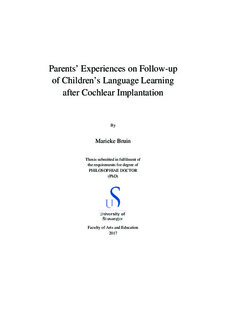Parents’ Experiences on Follow-up of Children’s Language Learning after Cochlear Implantation
Doctoral thesis
Permanent lenke
http://hdl.handle.net/11250/2455530Utgivelsesdato
2017-09-14Metadata
Vis full innførselSamlinger
- PhD theses (HF-IGIS) [23]
Originalversjon
Parents’ Experiences on Follow-up of Children’s Language Learning after Cochlear Implantation by Marieke Bruin, Stavanger : University of Stavanger, 2017 (PhD thesis UiS, no. 351)Sammendrag
This study explores parents’ experiences on follow-up of children’s language learning after cochlear implantation (CI). A cochlear implant is a surgically implanted hearing device that provides access to sound for a person diagnosed with profound hearing loss. In Norway, more than 90 % of children diagnosed with profound hearing loss receive a cochlear implant, often before their first birthday. Research states that the parents’ involvement is significant for outcomes after CI, which is why professional support for parents is considered crucial; however, the parents’ experiences with follow-up have received little scrutiny in research. The study’s overarching research question is what are parents’ experiences on follow-up supporting language learning after cochlear implantation, and how may these experiences be understood?
The study has a qualitative, explorative design and its empirical material consists of two data sets: 1) 27 written parental responses to an online questionnaire with open-ended questions, and 2) 14 verbatim transcripts of individual, semi-structured interviews with 14 of those parents. The study draws on analytical resources anchored in Foucauldian power/knowledge structures, conceptualizations of learning, as well as narrative methodological approaches. The study consists of four sub-studies, which together address the overarching research question.
The purpose of the study is twofold. Firstly, the study aims to contribute to the knowledge field concerning professional support for parents of children using a cochlear implant. Secondly, the study of parents’ experiences on follow-up after CI is situated within larger contexts of scientific and public discourse that address professional support for parents and parental involvement in general educational contexts. The answers to the overarching research question will provide grounds for discussing how the specific case of follow-up after CI may play into current discourses about parental involvement and support for parents in educational contexts on a more general level.
Main findings show that follow-up of children’s language learning after CI is generally constructed as a process of rehabilitation. The study brings to the fore that the parents’ experiences with follow-up are characterised by living with and responding to uncertainties. It is argued that the parents’ experiences may be understood as impressions of a performative, instrumental reasoning in follow-up, reflecting normalising practices, causing parents to become caught up in the current of a rehabilitation stream.
The study discusses possible consequences for the parents and children involved and emphasises that professional support may reduce the pressure of the language of instrumentality and its inherent focus on performativity, leaving room for parents to be parents, not teachers.
Beskrivelse
Doktorgradsavhandling i utdanningsvitenskap.
Består av
Bruin, M. (2015). Research on language development: Discourses on learning and messages to family support after CI. In H. Knoors & M. Marschark (Eds.), Educating Deaf Learners: Creating a Global Evidence Base (pp. 93-113). New York, NY: Oxford University Press.Bruin, M., & Nevøy, A. (2014). Exploring the Discourse on Communication Modality after Cochlear Implantation - A Foucauldian Analysis of Parents' Narratives. Journal of Deaf Studies and Deaf Education, 19(3), 385-399.
Bruin, M., & Ohna, S. E. (2015). Negotiating Reassurance: Parents’ Narratives on Follow-up after Cochlear Implantation. European Journal of Special Needs Education, 30(4), 518-534.
Bruin, M. (2017). Parental Involvement in Children's Learning: The Case of Cochlear Implantation - Parents as Educators? Scandinavian Journal of Educational Research DOI:10.1080/00313831.2016.1258728 Published online January 12th.

